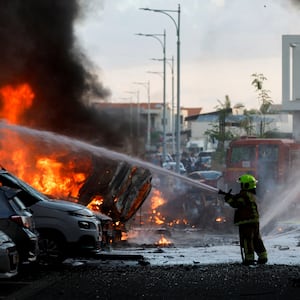The sudden, massive attack unleashed by Hamas against Israel on Saturday has its roots in a long history of conflict. It may seem to echo past attacks, but it is very different in several key respects.
First, it is by far the most complex attack yet orchestrated by Hamas against Israel. Secondly, it caught Israel completely unawares and, in many respects, unprepared. In fact, it represents the biggest Israeli intelligence failure in at least half a century. Finally, while Israelis and the world were justifiably outraged at Hamas’ brutality, the anger of millions of Israelis including many close to their security services was also directed at what was seen as the catastrophic mismanagement of Israeli national security by Prime Minister Benjamin Netanyahu and his administration.
Netanyahu has now promised a “prolonged” assault on Gaza in response. Weeks of bloodshed seem a certainty. Major Middle East diplomatic initiatives including “normalization” negotiations between Israel, Saudi Arabia and the U.S. will very likely be put on hold. And the future of both the Netanyahu government and the Hamas leadership seems very much in doubt.
The brutal Hamas attack, which included the launch of more than 2,500 missiles, armed incursions into southern Israeli communities, over 200 Israelis dead, and thousands more injured, as well as dozens of kidnappings, has already triggered a major Israeli response including air strikes in Gaza that have produced mass casualties. It is estimated that more than 200 Palestinians have died during the incursion and in Gaza as a consequence of the Israeli response.

Israeli Prime Minister Benjamin Netanyahu (3rd L) holds a meeting with security cabinet in Tel Aviv, Israel.
Anadolu AgencyHamas’ assault has been widely condemned by the international community. President Biden, following a conversation Saturday morning with Prime Minister Netanyahu, stated, “The United States unequivocally condemns this appalling assault against Israel by Hamas terrorists from Gaza.” He went on to state that the U.S. will offer “all appropriate means of support to the Government and people of Israel.” In a statement Saturday afternoon he reiterated U.S. support for Israel remains “rock solid” and warned others in the region, presumably Iran and its proxies, not to try to exacerbate the situation.
The reaction of Israel’s Middle East neighbors attempted to suggest a balance in the responsibility for the attacks between the Israelis and the Palestinians. The Saudis, Egyptians, and Turks, for example, all called for both sides to stop the violence and reduce the risks of further escalation. The official Saudi statement said, “Saudi Arabia warned Israel of the possible risks of escalation due to the occupation and deprivation of the Palestinian people of their legitimate rights.”
Russia called for “restraint.” Hezbollah, like Hamas a terrorist group backed by Iran, said they had been in “direct contact” with Palestinian leaders and that the attack was in response to Israel’s “continued occupation” and “a message to those seeking normalization with Israel.”
An Iranian spokesperson said, “The forceful response of young Palestinians today to the child-murdering Zionist regime showed that it is more vulnerable than ever and the young Palestinians have the upper hand.”
Netanyahu stated “we are at war” and called up Israel’s military reserves. But even as he did, there was an unprecedented surge of criticism of the prime minister that senior Israelis told me was “without precedent.” Veteran reporter Noga Tarnopolsky commented via X, “The Israeli army warned Netanyahu for months that his push for government overhaul put Israel at great risk of a multi-front attack. He dismissed their warnings by accusing the military of ‘joining the left-wing protestors’ against him. His ministers said the army could go to hell.”
Retired Israeli general Amos Gilad said, “The sources of this catastrophe lie in the regime change” (referring to the ascent of Netanyahu’s new ultra-government.) Another retired general asserted via X that Israel was left exposed to the attack because more than two dozen battalions had been transferred from the south to the Palestinian territories on the West Bank.
Israel’s opposition leader Yair Lapid offered to work with Netanyahu in an emergency government of national unity, asserting Israel would be incapable of waging a war with a team as “extreme and dysfunctional” as Netanyahu’s current extremist circle.
Taken together, the timing, volume and severity of the critiques of Netanyahu suggest that as Tarnopolsky concludes that while “Hamas leadership is unlikely to survive what is happening today… it is difficult to imagine how exactly Netanyahu survives this catastrophic failure and the inevitable commission of investigation to follow.”
Predictably, even in a moment like this one in which, in the past, President Biden could have expected bipartisan support for his actions, MAGA world instantly sought to blame the crisis on Biden. Typically, they bolstered their dangerous ideas with lies. Marjorie Taylor Greene, to choose one example, asked, “How much of the $6 billion dollars Joe Biden gave back to Iran funded this attack against Israel?” Donald Trump compounded the lie, asserting that U.S. taxpayer dollars helped fund the attack.
The U.S. has provided no funds to Iran. The funds to which Greene presumably was referring were those returned to Iran as part of a recent prisoner release agreement. That agreement made it clear that the use of the funds was restricted and was being carefully monitored specifically to ensure they could not in any way be used by Hamas or in any other way misused. But, as we all know, these days fomenting division is far more important to the American right than telling the truth.
To understand the true motivations behind the attack and in particular why it occurred now, is more complicated. First, any such analysis should make it clear that establishing the motivation for a crime does not diminish the fact that it is a crime. What Hamas has done will prove to have been both literally and figuratively indefensible. Nonetheless, as the Hezbollah statement indicated, one rationale for attacking now is that Hamas and their Iranian sponsors were concerned about the progress that was allegedly being made toward a deal “normalizing” Israel-Saudi relations.
Naturally, Iran saw the deal as strengthening their historical adversaries in the region and thus as undesirable. Undoubtedly they not only egged Hamas on but assisted them in preparing for the attacks. The Palestinians, on the other hand, were increasingly concerned that both the Israelis and the Saudis would effectively throw them under the bus en route to a deal. Netanyahu’s hard-right administration would not want to make serious concessions on the issue and it seemed like the Saudis would not demand such concessions.
This was just one factor however, behind the attack. Another of course, is the long history of animosity between the Israelis and the Palestinians, decades of distrust and, it must be acknowledged, the cycle of inhumane treatment of the Palestinian people at the hands of the Israelis and attacks on Israel from terrorist groups within the Palestinian territories. More specifically, however, the actions of the Netanyahu government had become increasingly inflammatory toward Palestinians with the annexation of Palestinian territory a certainty in the months ahead. And, clearly, Netanyahu was so distracted by his own fight for political and legal survival, his judicial coup and his struggle with pro-democracy protesters that this could also have been seen as a time when Israel would have let its guard down.
Parsing the origins of the attack is more difficult than determining what will happen next. Netanyahu’s government will unleash a devastating and protracted assault against Hamas and Gaza. Horrors will ensue. Hamas will likely be devastated. But so too will be civilian bystanders, and the already inhospitable, overcrowded infrastructure of Gaza. Some portion of the response will be justified. Some portion of it will be overkill.
International debate and condemnation of both sides will follow. Neither will emerge closer to peace. So long as the assaults continue and for a good while after, the prospects of resuming the Saudi-Israeli talks will be dim. Ultimately, the Israelis will likely decapitate much of Hamas’ leadership.
What makes this particular crisis unusual, however, is that it is also possible that in the wake of the conflict to come and following an investigation of the origins of the massive intelligence and preparedness failure by the Netanyahu government, the people of Israel may then send their own government packing. Certainly, it is a fate Netanyahu deserves for many, many reasons.
That said, given Saturday’s carnage and that which is certain to follow, I think it is fair to say we should all be more concerned with the fate of the people of Israel and of the Palestinian territories than that of their governments, both of which continue to serve their people abysmally.








